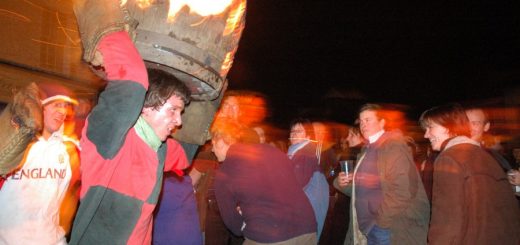Whittlesey Straw Bear
Some sources say this festival takes place on the Monday after twelfth night (Plough Monday), the tuesday following Plough Monday or the Saturday. Either way, a man is dressed from head to foot in straw bundles and dances around the town of Whittlesey, going from house to house looking for gifts of food, money and beer.
![Kev747 at en.wikipedia [GFDL (http://www.gnu.org/copyleft/fdl.html) or CC-BY-SA-3.0 (http://creativecommons.org/licenses/by-sa/3.0/)]](http://www.mysteriousbritain.co.uk/wp/wp-content/uploads/2018/12/Straw_Bear-224x300.jpg) “… he was then taken around the town to entertain by his frantic and clumsy gestures the good folk who had on the previous day subscribed to the rustics, a spread of beer, tobacco and beef”. (1882 newspaper description)
“… he was then taken around the town to entertain by his frantic and clumsy gestures the good folk who had on the previous day subscribed to the rustics, a spread of beer, tobacco and beef”. (1882 newspaper description)




Re: Whittlesey Straw Man
The following article entitled ‘Wassailing and other weird folk rituals’ appeared in The Guardian on 8 February 2012.
Singing to apple trees, kissing a straw bear and wrestling a keg of beer down a hill … country rituals may sound silly, but they’re good for the soul, says Tom Cox
"Excuse me. You’re not on the way to the wassail, by any chance?" The hood on my duffle coat has a blind spot, but it was a windy January night in Darkest Norfolk, my friends Jack and Hannah and I were feeling a little shaken after visiting an Anglo Saxon burial mound in fading light, and the stranger, whose name turned out to be Jim, really did seem to come out of nowhere.
I jumped a little at the sound of his voice. On the other hand, I was quite pleased. OK, so there weren’t many people on the street in the village of Kenninghall at this time on a Saturday, and if you saw three of them, two of whom had beards, and there was a small folklore event being staged not far away in 30 minutes, it would be logical to assume that they might be on their way to it. Yet the fact remained: Jim, an organic vegetable grower from Bungay, had spotted Jack, Hannah and me, and thought, "They look like people who would wassail!" As gratifying pagan assumptions about my appearance went, this was up there with the time an old man in a Norwich pub ran his hand along the lapel of my corduroy jacket and said, "You look like you’re from The Wicker Man."
As I confessed to Jim, it would in fact be my first time taking part in the central ritual of the evening. When I’d told people about my intention to go wassailing, many asked, "Is that like abseiling?" Wassailing – Old English for "be healthy" – is either far less brave or much braver than that, depending on whether you’re a folkophobic sort who runs in terror from people in hare’s head masks. It comes in two forms: the house-visiting wassail, which involves wishing health upon your neighbours via drink and song, and the rural wassail, such as the one taking place in Kenninghall, usually entailing a visit to an orchard to sing to apple trees and splash cider on them in an effort to encourage a good crop for the coming year. It sounds silly, but then most things that are best for the human spirit do.
I’d seen photos from previous Kenninghall wassails in my local newspaper: it was the kind of offbeat story you got sandwiched between more pressing ones about a village-wide power cut or a peacock that had been trying to shag a petrol pump just off the A140. The pictures – usually featuring a robed, leafy-faced man called The Lord Of Misrule – had intrigued me, but the date of the event seemed a well-kept secret. This year, though, I’d been able to find it out, by eschewing the internet and partaking in the antediluvian English custom known as "asking some people who might know".
Folks had their varying reasons for attending the Kenninghall wassail. Shortly after arriving, I introduced myself to The Lord Of Misrule, who explained that when not wassailing he was a homeopath called Steve, and he was here primarily due to his concern for the earth’s resources. There was Jim, who was interested in what singing could do for his own orchard. Then there was me, who was there primarily due to liking few things better than pretending I’m in some lost footage of the superior initial incarnation of Steeleye Span during the winter of 1970.
Festivals with a difference
With my attempts to get more involved in country life, my definition of "festival-going" has changed recently. The last two festivals I attended before Kenninghall respectively involved several hundred men wrestling a keg of beer down a Leicestershire hillside and a giant straw animal-person parading drunkenly through the streets of a Fenland town.
Last summer was my first time at Hallaton Bottle Kicking Festival, in which the neighbouring Midlands villages of Hallaton and Medbourne attempt to force some old-fashionedly packaged alcohol over their home streams whilst losing a vast amount of footwear. Described by Clive Aslet in his book, Villages Of Britain, as "a cross between a rugby scrum and a civil war", it has few rules, though "weapons and eye gouging" are banned. I was particularly interested, since as a Beano reader I’d always wondered what it would be like to see a real life ball of dust with some arms and legs sticking out of it. I just about resisted the temptation to join in on the basis I’d only recently had my suede loafers reheeled.
I’ve always kept my distance from The Straw Bear, in the decade that I’ve been watching it gambol and dance around the Cambridgeshire town of Whittlesey to celebrate Plough Monday. A while ago, The Straw Bear Festival also ran an exchange with a German town with its own similar festival. This permitted the more diminutive German Bear to join in the jolly-yet-macabre parade, stopping every so often, as tradition dictated, to grab a female off the street, releasing her only when she had granted him a kiss. The German bear was absent this year – I don’t think those I heard speculating about prison were serious – but his straw shoes were filled with ample eccentricity by the bearers of a stretcher laden with "dead" teddy bears, and a man wearing a pretend horse around his waist and feeding it mini Shredded Wheats.
Straw Bear is a notable omission from Here’s A Health To The Barley Mow , a brilliant new DVD compiled by the BFI, featuring rare archive clips of ancient rural games and folk rituals. The footage on this collection goes back to 1912, but these customs of mummers plays and primeval rugby games mostly continue, and, if you looked hard enough, you could probably attend one of them every week.
One element that could be viewed as surprising at Whittlesey and Hallaton is the large number of attendees in the 15-25 age group. You could put this down to the extensive opportunities presented at both for binge drinking, but I think it goes beyond that. Excepting the isolated occasions when racists have tried to claim them for their own, these festivals put us in touch with our Englishness in a healthy way, connecting us with our surroundings in a manner that’s increasingly refreshing when so many of us live online.
The first time I attended Straw Bear, I did so with the wry, distanced eye of a recent London escapee. I’m still a little wary of it: I find it fascinating and uneasy in equal measure, and not all the unease is the intentional, pantomime kind. But at Kenninghall, joining in the festival’s very own wassailing song, ‘Dance Round The Firelight’, and shouting to scare away the "nasty frost giants" upon the Lord Of Misrule’s urging, I felt caught up rapturously in a timeless, wintry, shared warmth. You also know you’ve had a good evening when you’re invited for soup with a man dressed as a fox and come away with a note in your pocket reading, "Call Becky re sheep".
"It’s very Wicker Man," said Hannah. Alright, so The Wicker Man’s setting, Summerisle, did feature human sacrifice, but take that away, and what did you have? You had a very picturesque place to live, with some great music and a strong sense of community. Only this was arguably even better. Summerisle had the songs and the polo necks, but what it lacked was a really good population centre nearby, with decent arts funding and a Wagamama. As we stood warming ourselves by the bonfire, listening to a lady with antlers try to recruit us for her morris dancing troupe, pagan life had never been so good.